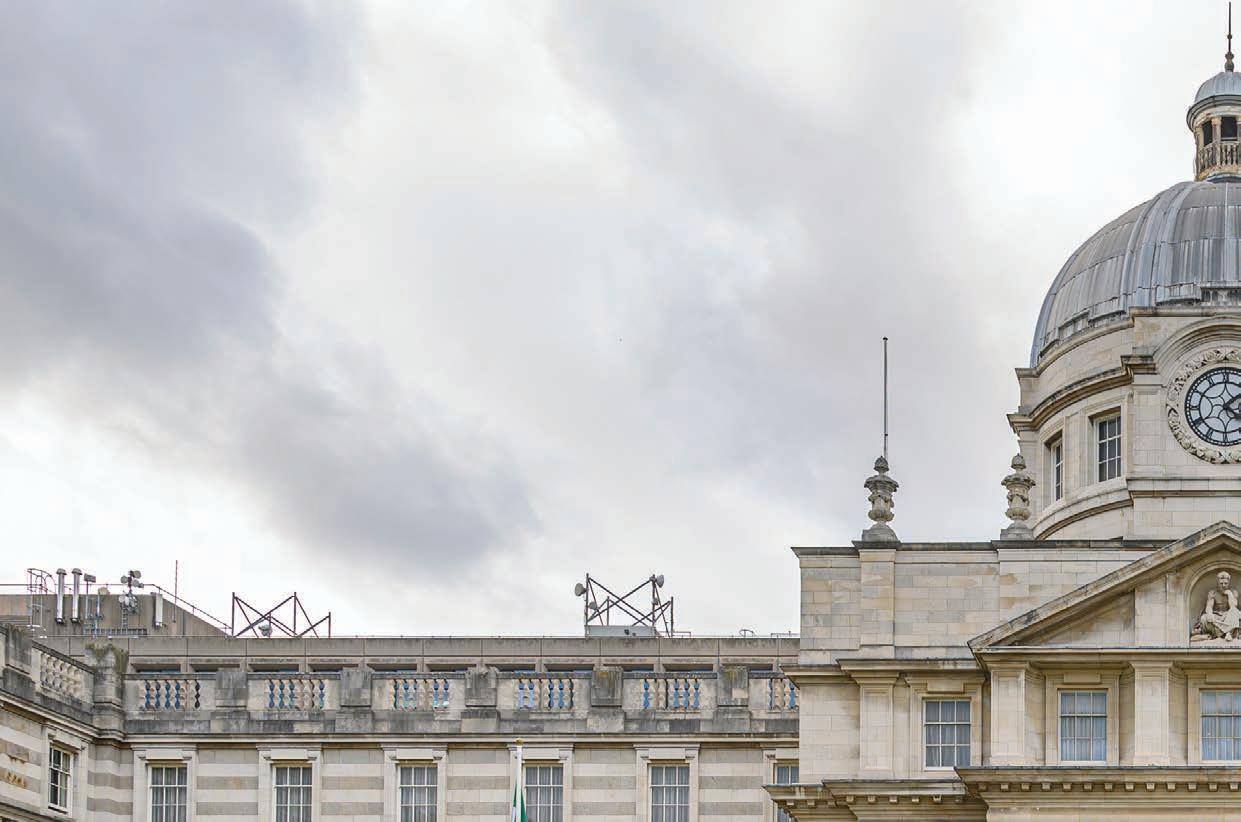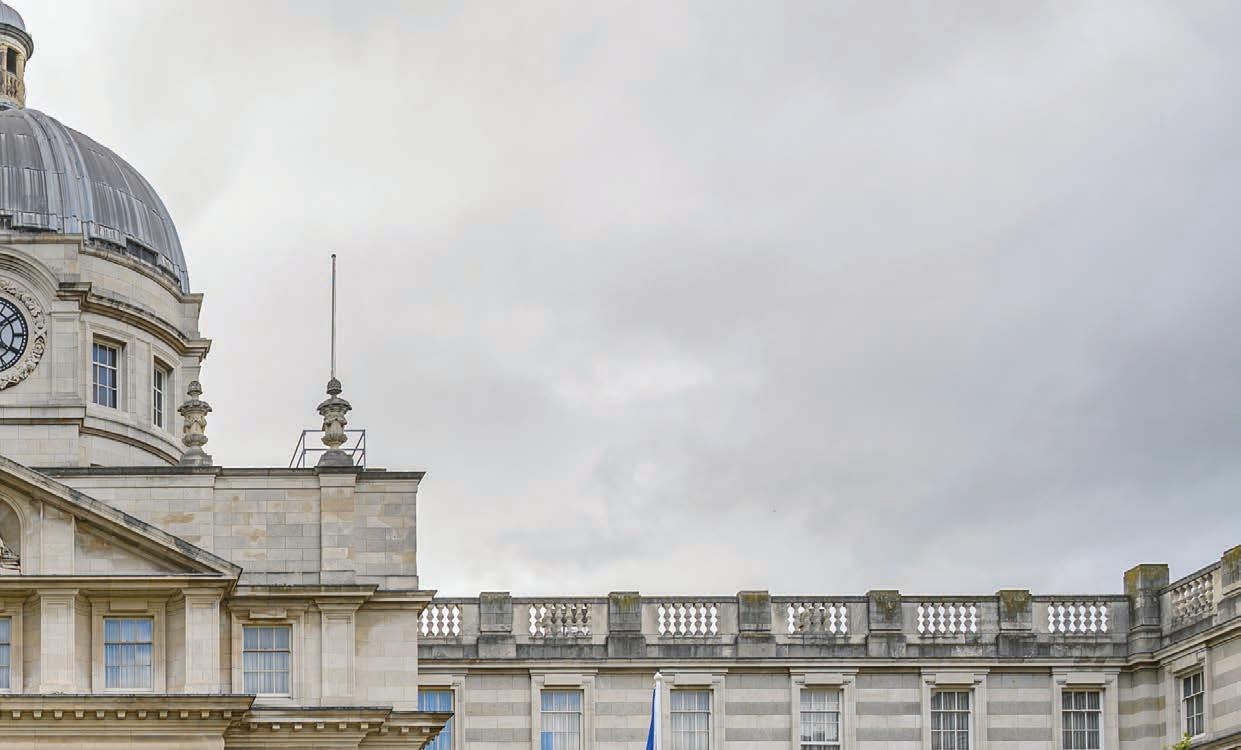
16 minute read
Secretaries general in profile



Each government department has a leader at civil service level known as the Secretary General. They are responsible for overseeing the implementation of government policy. There are 18 government departments, each of which has a secretary general, each of whom are answerable to the minister of the department in question.
Brendan
Gleeson was
appointed Secretary General of the
Department of Agriculture, Food and
the Marine on 2 October 2018. He has previously served in a number of senior leadership roles in the Department, with responsibility for areas such as international trade, Brexit, Common Agricultural Policy development and sectoral policy development in the meat and livestock sectors. He has also had responsibility for governance in several state agencies, served as a member of the Teagasc Authority, and in policy and operational roles in the Department of Industry and Commerce and the European Commission.
He holds a BSc in management law from Trinity College Dublin and diplomas in law and public administration. He is also an alumnus of the Common Purpose Senior Leadership Programme and the Harvard Kennedy School Senior Managers in Government Programme.

Kevin McCarthy
was appointed Secretary General in the Department of
Children, Equality, Disability, Integration and Youth
on 19 January 2022. He previously served as Secretary General of the Department of Rural and Community Development from 2017 and as an Assistant Secretary General in the Department of Education from 2008 to 2017, where he held a number of senior leadership roles. In the earlier part of his career he worked in a number of roles in the Departments of Health and Finance and in the health sector. Jacqui McCrum was
appointed to the post of Secretary General of the Department of Defence in August 2020. She is the first female Secretary General of the Department. In her capacity, she acts as the principal policy advisor to the Minister for Defence and as the Accounting Officer for all Defence expenditure. She is a member of the advisory board of the National Shared Services Office. Prior to her appointment, McCrum was the Deputy Secretary in the Department of Employment Affairs and Social Protection, the Director General and Accounting Officer in the Office of the Ombudsman, Offices of the Information Commissioner and Commissioner for Environmental Information, Standards in Public Office Commission, Referendum Commission and Commission for Public Service Appointments. She also held the position of Deputy Financial Services Ombudsman. The majority of her career was spent in financial services in London and Dublin.
Secretaries general: In profile
Bernie McNally
was appointed Secretary General of the Department of Education in February 2022. The Department leads on primary and post-primary education policy in Ireland and supports 4,000 schools and almost 1,000,000 children and young people
Between 2015 and 2022, she was Assistant Secretary in the Department of Children, Equality, Disability, Integration and Youth, and before that was Director General of the Office of the Ombudsman and Information Commissioner from 2012 to 2015.
In her earlier career, she was an occupational therapist and worked for a short time in both the UK and USA. She was later Director of Therapy and Social Work services in St James’s Hospital, Dublin. Bernie has a BSc and MSc from Trinity College Dublin and an MBS from University College Cork. She has also completed several senior leadership programmes.
Orlaigh Quinn is
Secretary General of the Department of Enterprise, Trade and Employment.
A career civil servant, she has held leadership positions across several public bodies, spearheading reform of Ireland’s public and Civil Service at the Department of Public Expenditure and Reform and as Head of Corporate and Head of National Pensions in the Department of Employment Affairs and Social Protection. She has also led on EU and international affairs and served as an expert adviser on employment and social policy at the European Commission.
She is a former Visiting Research Fellow of Trinity College Dublin and holds a master’s in public management and a doctorate in governance from Queen’s University Belfast. She is the author of two books on public policy topics. John Hogan is the

Secretary General of the Department of Finance. He has held a number of positions in the Department throughout his career. He was previously Assistant Secretary General with responsibility for tax policy and prior to that for banking policy in the Financial Services Division of the Department.
He has worked as Financial Services Counsellor in the Permanent Representation of Ireland to the European Union and has held posts in a number of Government Departments
Joe Hackett has
served as Secretary General of the
Department of Foreign Affairs
since September 2021. He joined the Irish Department of Foreign Affairs in 1995 and has since served in a variety of positions at HQ and abroad.
Prior to his appointment as Secretary General, he was Director General of EU Division (2019-2021), also serving in Brussels as Deputy Permanent Representative of Ireland to the European Union (2017-2019) and as Permanent Representative to the EU’s Political and Security Committee (2013-2017). He also has extensive experience of managing Ireland’s bilateral relationship with the United States and engaging with the State’s global diaspora and international business community. Jim Breslin is
Secretary General of the Department of
Further and Higher
Education,
Research, Innovation
and Science. In 2011, he led the establishment of the Department of Children and Youth Affairs. Subsequently, he was Secretary General of the Department of Health for six years from 2014 to 2020.
He previously held senior management roles within the HSE and the ERHA. He has a master’s in public administration (mid-career) from Harvard University’s Kennedy School of Government, MSc in economics from Trinity College/Institute of Public Administration, BA in economics and politics from UCD and a diploma in company direction from the Institute of Directors. He holds a Policy Leader Fellowship at the Centre for Science and Policy, University of Cambridge.
Robert Watt is
Secretary General of the Department of Health. Previously, he spent 10 years as Secretary General in the Department of Public Expenditure and Reform. With the Department of Finance, he managed the budget and estimates process. During this period he was one of the principal advisers to the Government on economic, budgetary and financial policy issues. He was centrally involved in the management of the Troika programme.
He is an economist with experience in both the public and private sectors, having worked in several roles within the Department of Finance as well as previously working as an economic consultant and a lecturer. He has been a member of numerous boards including the board of the NTMA and the Economic Management Council. He is currently a board member of the Football Association of Ireland.
Secretaries general: In profile
Graham Doyle is
Secretary General of the Department of
Housing, Local Government and
Heritage, having been appointed in July 2020 after the formation of the new Government. Previously he was Secretary General of the Department of Transport, Tourism and Sport since late 2015.
He was an external recruit to the Civil Service in 2013, initially responsible for the public transport. His background is in aviation management and business consulting with experience in insolvency, corporate finance and business strategy. He is a chartered accountant by profession, having trained with PwC, and holds a range of business-related qualifications, including an MBA.
Oonagh
McPhillips is

Secretary General of the Department of Justice and was the first woman to hold the role when she was appointed in 2020. She joined the civil service in the 1980s as a temporary clerical trainee.
She previously served in the Department of the Environment, as a civilian manager in An Garda Síochána, and in Áras an Uachtaráin. Her career has been mainly in justice, where she has worked on policy, governance, legislation and as head of corporate, as well as private secretary and press officer to successive ministers. She holds a master’s in communications from Dublin City University and in 2016 she was awarded an Eisenhower Fellowship focusing on organisational culture.
David Moloney

is the Secretary General of the
Department of Public Expenditure
and Reform. Prior to this, he was head of the Labour Market and Enterprise Division of the Department, with responsibility for various expenditure areas including social protection, housing, enterprise and agriculture and for the Irish Government Economic and Evaluation Service (IGEES).
Over the course of his career in the Civil Service, David has also served in the Department of the Taoiseach, the Department of Finance and the Department of Health. Mary Hurley, was
appointed as Secretary General of the Department of
Rural and Community
Development in March 2022. A graduate of University College Dublin (UCD), she previously served as an Assistant Secretary at the Department of Housing, Local Government and Heritage, and has held the responsibility for policy areas such as local government, fire and emergency management, homelessness, regeneration, community and rural development. Over the course of her career, she has also worked across a number of departments, including the Department of Arts, Heritage and the Gaeltacht, where she played a key role in the 1916 commemorations.
John McKeon
joined the
Department of Social Protection
in October 2010 as Assistant Secretary General. Prior to that he was Managing Director of eircom Wholesale, having joined the Department of Posts and Telegraphs aged 16 as a trainee technician based in Waterford in September 1979 and subsequently moving on to Telecom Éireann and then eircom. While with eircom he worked in a variety of roles from technical operations to procurement, treasury operations, pricing and forecasting, investment evaluation, marketing, new enterprise development, organisation development, and international business.
Prior to his appointment as Secretary General, he held responsibility within the Department for labour market activation policy, the development and implementation of the Pathways to Work programme, and the modernisation of the Department’s public office
Secretaries general: In profile
(Intreo) services. He also held responsibility for staff relations and finance, legislation and PRSI policy.
He holds an honours primary degree in public administration (Institute of Public Administration) and a master’s in business administration (DCU).
Mark Griffin
commenced duty as Secretary General of the Department of
the Environment, Climate and
Communications in September 2013. In his current role he has responsibility for key sectors and policy areas including climate action, environment, circular economy, energy, telecommunications and cybersecurity.
Prior to his appointment, Mark was Assistant Secretary for Water at the Department of Environment, Community and Local Government. He also led the planning division in the Department for much of that time. Prior to that, he served in the Department of Foreign Affairs as Environment Counsellor at the Irish Representation to the European
Union in Brussels. He has also worked in the Department of Finance. Mark is a graduate of Trinity College Dublin.
John Callinan


was appointed as
Secretary General of the Department of the Taoiseach in May 2022.
Previously, he was the Second Secretary General at the Department of the Taoiseach since 2016. In that role he had lead responsibility for the International and EU Affairs Division and the Britain/Northern Ireland Division, including the Shared Island Unit. He was also the Taoiseach’s “sherpa” (senior EU advisor) and lead negotiator on Brexit.
He joined the Department of the Taoiseach in 1998 and worked in a number of policy areas since then. He was appointed Assistant Secretary General in 2007 and led several divisions in the Department between 2007 and 2016, including Economic Policy, Social Policy, EU and International Affairs, and Britain/Northern Ireland.
Prior to joining the Taoiseach’s department, he worked in a number of areas at the Office of the Revenue Commissioners. A graduate of Trinity College Dublin, he also spent four years at the European Commission in Brussels.
Katherine Licken was
appointed to the post of Secretary General at the
Department of Tourism, Culture, Arts, Gaeltacht, Sport and
Media, formerly the Department of Culture, Heritage and the Gaeltacht, with effect from 20 January 2017. The Department has a broad range of functions relating to arts and culture, the national cultural institutions, film, media, tourism, sport and the Irish language and the Gaeltacht.
Licken was previously an Assistant Secretary in the Department of Communications, Climate Action and Environment.
She is a graduate of communications studies in Dublin City University and has a postgraduate diploma in corporate governance from the UCD Michael Smurfit Graduate Business School.
Ken Spratt has
been Secretary General at the
Department of
Transport since July 2020. He previously served in six other government departments including as Assistant Secretary General for Tourism and Sport and Assistant Secretary General for Energy.
He holds a Master of Science degree from Letterkenny Institute of Technology and Ulster University, Jordanstown and is a graduate of the Institute of Directors, Ireland, and the Chartered Institute of Personnel and Development, UK. He holds thirdlevel and professional qualifications in HRM, employment law, economics, systems analysis and corporate governance.

The Protocol, the next British Prime Minister, and prospects for Irish unity

The next leader of the Conservative Party will be announced on 5 September 2022. That person, Liz Truss or Rishi Sunak, will be the fourth leader of the Conservative Party since the UK voted to leave the EU in 2016. The careers of Conservative Party Prime Ministers have been among the many casualties of Brexit, write Mary C Murphy (UCC) and Jonathan Evershed (UCD), authors of A Troubled Constitutional Future: Northern Ireland after Brexit published by Agenda Publishing in March 2022.
In Northern Ireland, ongoing uncertainty in relation to the implementation of the Ireland/Northern Ireland Protocol; the British Government’s plans to proceed with the highly contested Northern Ireland Protocol Bill; and the collapse of the Northern Ireland Executive have all added to an existing atmosphere of instability and volatility. This state of unsettledness has also influenced and facilitated a growing discourse about the prospects for Irish unity. Some see Irish unification as the organic and inevitable outcome of Brexit’s legacy while others reject and oppose this prospect.
The next British Prime Minister will be facing urgent challenges come September 2022 – not least a rapidly intensifying cost of living crisis – but the Protocol issue and the “Irish question” will also loom large. Although the potential for a constitutional rupture exists, there is no guarantee that profound constitutional transformation is inevitable. However, how the new Prime Minister navigates the period ahead will have a bearing on the strength and intensity of the evolving constitutional debate in Ireland: his/her decisions and actions on the Protocol will influence how different political parties, civic society movements and future Irish governments position themselves on the Irish unity question.
For its part, the current British Government does not support calling a border poll and this will not change following the election of the next Prime Minister. Successive Conservative governments have sought to assert an increasingly muscular form of unionism which has been alienating not just for nationalists in Northern Ireland, but across Scotland and Wales too.
Further British Government action on the Protocol may serve to either reduce or reinforce wider calls for a border poll and constitutional change in Ireland. Should the new Prime Minister oversee the Northern Ireland Protocol Bill becoming law, the EU will likely retaliate with (further) court proceedings against the UK. In this context, the prospects of a bitter and damaging trade war between the UK and the EU cannot be discounted. Such a move would be highly damaging politically and economically, and likely intensify calls among nationalists for constitutional change. Critically, it may also sway otherwise undecided voters in Northern Ireland and the Republic of Ireland.
A related factor here is the poor level of trust between the British and Irish governments. This has undermined the bilateral relationship and upended what had previously become a more consensus-based approach to Northern Ireland. If the new Prime Minister chooses to work to address the challenges facing British/Irish relations (most of them concentrated around the Protocol) in a spirit of meaningful collaboration, this bodes well for restoring an atmosphere of cooperation and consensus, which has historically been critical to stability in Northern Ireland. If not, the push for constitutional change may well intensify.
The current Irish Government has ruled out supporting a border poll in the short to medium term. Instead, Taoiseach Micheál Martin TD has ploughed money and commitment into his department’s Shared Island Initiative. Its emphasis is less on constitutional change, and more on supporting the full operation of the 1998 Agreement. Importantly however, the next Irish Government – particularly Mary C Murphy Jonathan Evershed


one that might be led by Sinn Féin – is likely to take a different and stronger position on the border question.
Unionists in Northern Ireland are utterly opposed to a border poll and are loath to even discuss or consider the question. Instead, unionism has remained resolutely focused on resisting the Protocol, which they see as undermining Northern Ireland’s place in the Union, and on supporting the Northern Ireland Protocol Bill. How the next Prime Minister engages with unionism on the Protocol issue will be consequential, and not just for unionism but for all in Northern Ireland. A more considered position on, and a more inclusive approach to, the Protocol which takes note of all swathes of opinion in Northern Ireland may temper calls for an intensification of the Irish unity debate.
The third force in Northern Ireland politics – that which is classified as ‘other’ and is neither unionist nor nationalist in outlook – is also reticent about a referendum on Irish unity. This political category includes the Alliance Party, a party which has been gradually increasing its electoral appeal and is now the third largest political party in Northern Ireland after Sinn Féin and the DUP.
Alliance does not take a position on the constitutional question. However, it is Northern Ireland’s ‘others’ who will be decisive in shaping the future direction of the constitutional debate in Ireland. Alliance supporters are more malleable on the constitutional question than are committed nationalists and unionists. How the new Prime Minister deals with Northern Ireland and the interests of this constituency may prove critical in directing the nascent constitutional debate.
Sinn Féin is spearheading calls for a border poll. For many nationalists, the chaotic manner in which the British Government has managed Northern Ireland interests since the Brexit vote, has been a decisive factor in swaying them towards more serious and more immediate contemplation of an altered constitutional future. Brexit has also precipitated the emergence of civil society groups including Shared Ireland, Think32, and others actively pushing for a border poll. This cohort is already focused on the achievement of a new constitutional future, and regardless of the actions of the next British Prime Minister, is unlikely to backtrack on its push for constitutional change.
Importantly, however, for all the unsettledness which Brexit has created in Northern Ireland, it has not led to the emergence of majority support for constitutional change. Despite important shifts in public opinion flowing from Brexit, opinion polls continue to suggest a majority in favour of Northern Ireland remaining part of the UK. It is not clear, therefore, that the UK vote to leave the EU will inevitably lead to a new constitutional settlement for the island of Ireland. What is clear however, is that the next British Prime Minister and how he/she deals with the Protocol issue will be a critical factor influencing the direction of the constitutional debate.










